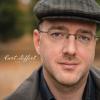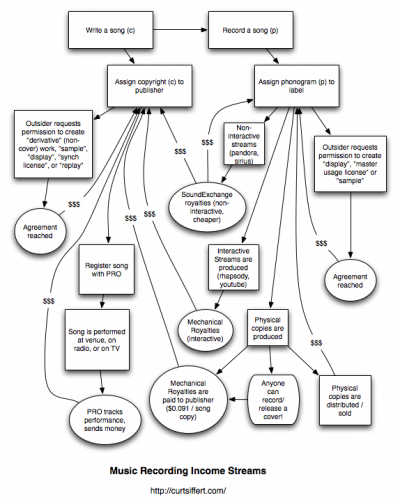Shipping the CDs
 One of the things I had to decide before putting the cd up for sale was how to ship it.
One of the things I had to decide before putting the cd up for sale was how to ship it.
There is a dizzying array of options for independent musicians out there, and an even greater number of opinions on the right way to do it. But regarding the shipment of physical cds, to me it seemed to come down to three basic options: CDBaby/Amazon, Bandcamp, or Do-It-Yourself.
The first thing is that as a musician looking for information, CDBaby and Bandcamp are very, very loudly recommended by outside sources. It just seems to be what people do, and so everyone else seems to do it too.
I tried to do a bit of an analysis regarding the different options. While writing songs and selling cds as an independent musician isn't exactly a lucrative money-making business, we still might as well try to look at things rationally, right? Here's what I came up with.
My cds have a printing cost of $3.33 apiece. I could have knocked the printing cost lower by printing more cds, but then I was reducing my probability of meeting the overall cost.
For a seven-song cd, $10 seemed to be a good round number. People are still often selling full physical cds for $12-$15, and the cd length is technically considered a "mini-album", bigger than an EP, so $10 seemed about right.
That basically means I have about $6.50 of margin to play with when deciding how to handle order fulfillment.
CDBaby / Amazon
CDBaby charges $4/cd for fulfillment, and that doesn't include the $3.69 shipping that a US person will pay. So that means a user would pay $13.69, and I'd get $6 net, or about $2.50 margin after printing costs.
Amazon has two methods. If you use them for orders, but handle shipments yourself, Amazon charges between $3 and $4 per cd, and shipping costs are roughly covered via a shipping credit they give you. So we can roughly call it $7 net, or about $3.50 margin after printing costs.
Amazon's second method is if they do their own fulfillment. In that case, shipping costs are taken out of the equation, but overall feels looks to approach $6 or so. In that case, it's around $4 net, or less than $1 margin after printing costs.
Bandcamp
Back at the time I first looked into this, I honestly thought that they didn't allow selling physical cds if you weren't also selling digitally, and I wasn't ready to sell digitally. I've since found out that you can actually sell merchandise-only on bandcamp, so it is still an option for what I'm doing.
However, when selling merch only, bandcamp's product really is just a shopping cart. You can do some website redirection tricks and they have some good handling for different shipping pricing options, but the upshot is that it's basically a shopping cart with a design on top of it.
For merch, bandcamp's fees are 10%, on top of normal payment processing fees. For a $10 cd, that basically means it would be taking $1, or 15% of my margin opportunity for every cd - the margin works out to be about $5.50 per cd after printing costs.
One twist to bandcamp is that you can set a minimum price, but allow people to pay more. Bandcamp swears that they see people using this regularly although it's tough to say how scientific that measurement is. They have a few other interesting features too. I decided against it at first, but I might still consider switching to it in the future.
Do It Yourself
I looked around at a bunch of shopping carts and credit card processors. I'm a professional "internet architect/programmer" consultant by trade, so I've done a few implementations in the past. But what's funny is that for a project like this, the plain old Paypal purchase flow was the best fit. It's direct, familiar, and cheap. Lots of people use it and it's hooked up to bank account. On top of that, Paypal has a discount relationship with the United States Postal Service, so I get a break on the shipping charges, too.
For all these other card-processing services out there, they all have the same basic underlying rate of 2.9% + $0.30, or about $0.58 for each of my cds. Since I also tack on shipping charges (which are less than the shipping charges for Amazon and CDBaby), that is covered, and I end up with a net of just about $10/cd, or a margin of around $6.50 after printing costs.
The Result
I ordered padded shipping envelopes from Amazon. You can get them in packs of 100, and it works out to about $0.29 apiece. I took a package to the Post Office and got a postage quote of about $2.24 . But then using the Paypal "multi-shipping" tool, I see that the per-item cost is actually $1.83 . So each time I get an order, I follow this process:
- Log in to paypal - the order is right there.
- Click the link for their "multi-shipping tool". Orders are automatically imported.
- Apply a preset I made for the product - envelope size and weight (4 oz). All orders are updated.
- Click to print. Shipping costs are deducted from my paypal account automatically.
- Cut out the shipping label (yes, I use scissors!)
- Write a hand-written thank-you note to the purchaser with the rest of the paper. (You can't do this if you use CDBaby.)
- Tape the shipping label to the envelope, package it up, seal.
- Drop it in my mailbox
Honestly, while I could see this getting annoying if I were dealing with huge numbers of orders every day, I find it pretty fulfilling to do this at home. (My favorite part is actually the little thank-you notes!)
The CD
Remember the cd is still for sale, and you can get it on its album page. Here are the audio previews of the seven songs!

